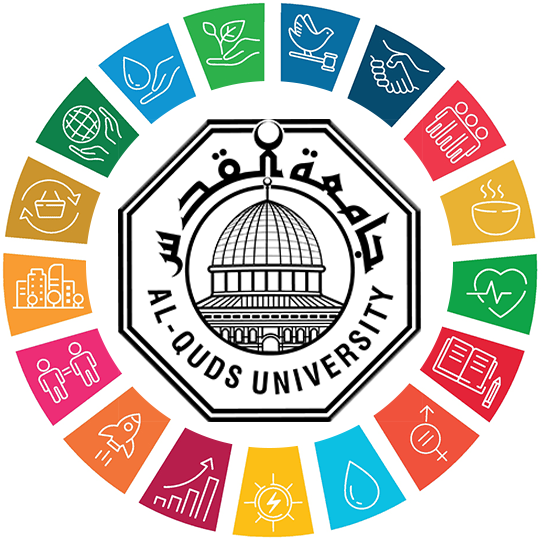The number of hungry people remains unacceptably high even with successful economy around the world, Goal2 calls for end hunger and ensure food access by all people, in particular the poor and people in vulnerable situations including infants, and supply them with safe, nutritious and sufficient food all year round.
Al-Quds University is committed to addressing global hunger and ensuring food security through its academic programs, research initiatives, and community engagement efforts. The university contributes to SDG 2 in several ways:
Agricultural and Food Sciences Education: The university offers degree programs in agriculture, food sciences, and related fields, providing students with the knowledge and skills needed to develop innovative solutions to food security challenges. These programs focus on sustainable agricultural practices, crop and livestock management, and food processing, among other topics.
Research on Food Security and Nutrition: Al-Quds University conducts cutting-edge research on various aspects of food security and nutrition, including crop production, soil fertility, water management, and post-harvest handling. This research helps identify new technologies, practices, and policies that can increase agricultural productivity, reduce food loss and waste, and improve the quality and safety of food supplies.
Collaboration with Local Farmers and Food Producers: The university works with local farmers, food producers, and agricultural organizations to promote sustainable agricultural practices and enhance food security. Through workshops, training sessions, and on-site consultations, Al-Quds University provides technical assistance and support to help farmers increase crop yields, improve soil health, and adopt environmentally friendly farming methods.
Community Nutrition Programs: Al-Quds University actively engages in community nutrition programs that aim to reduce malnutrition, especially among vulnerable populations such as children and pregnant women. These initiatives involve providing education on proper nutrition, distributing food to those in need, and promoting the consumption of nutrient-rich, locally produced foods.
Collaboration with Local Farmers and Food Producers: The university works with local farmers, food producers, and agricultural organizations to promote sustainable agricultural practices and enhance food security. Through workshops, training sessions, and on-site consultations, Al-Quds University provides technical assistance and support to help farmers increase crop yields, improve soil health, and adopt environmentally friendly farming methods.
Community Nutrition Programs: Al-Quds University actively engages in community nutrition programs that aim to reduce malnutrition, especially among vulnerable populations such as children and pregnant women. These initiatives involve providing education on proper nutrition, distributing food to those in need, and promoting the consumption of nutrient-rich, locally produced foods.
Innovation in Sustainable Food Systems: The university encourages research and innovation in sustainable food systems, exploring topics such as vertical farming, precision agriculture, and alternative protein sources. By fostering innovation in food production and distribution, Al-Quds University contributes to the development of more resilient and sustainable food systems that can better withstand the challenges of climate change, population growth, and resource scarcity.
Advocacy and Policy Development: Al-Quds University plays a key role in advocating for policies and strategies that address food security and hunger at local, national, and international levels.
at the local level the university aiding people by:
- Provide food boxes in different seasons
- sponsoring 90 orphan children
- sponsoring more than 50 cases of children with special needs and taking care of them
- Producing more than 50 tons of organic agricultural products (vegetables, fruits, herbs) from the university’s private farms, benefiting poor families in the local community.
- provides local farmers with knowledge, agricultural extension and sustainable farming methods through workshops, conferences and scientific research organized by the College of Agriculture and Veterinary Medicine
- enables local farmers to access scientific agricultural facilities, laboratories and centers and provides advisory services to them
- seeks to support and purchase local products.
- Put policies to reduce food waste
- Holding annual exhibitions of food products (meat – dairy – fruits – vegetables – etc.) at low prices for all citizens
- Enabling agriculture, combating desertification and preserving lands through projects, research and awareness raising
In summary, Al-Quds University is dedicated to achieving SDG 2 through a multi-faceted approach that includes education, research, community engagement, innovation, and policy advocacy. By working closely with local communities and stakeholders, the university plays a crucial role in the fight against hunger and contributes to the creation of a more sustainable, food-secure future for all.
SDG 2 (Zero Hunger) Progress:
Al-Quds University has been actively contributing towards achieving SDG 2: Zero Hunger, through a comprehensive approach that includes academic programs, research, community engagement, and advocacy. The university offers degree programs in agriculture, food sciences, and related fields, equipping students with the knowledge and skills to tackle food security challenges. These programs emphasize sustainable agricultural practices, crop and livestock management, and food processing.
Moreover, Al-Quds University is involved in cutting-edge research on food security and nutrition, addressing critical issues like crop production, soil fertility, water management, and post-harvest handling. This research contributes to developing new technologies and practices that can enhance agricultural productivity, reduce food loss and waste, and ensure the quality and safety of food supplies.
The university also collaborates with local farmers and food producers, promoting sustainable agricultural practices and enhancing food security. Through workshops, training sessions, and on-site consultations, Al-Quds University offers technical assistance to help increase crop yields, improve soil health, and adopt environmentally friendly farming methods.
In terms of community engagement, Al-Quds University is deeply involved in community nutrition programs. These programs are focused on reducing malnutrition, particularly among vulnerable groups like children and pregnant women. They include educating the community on proper nutrition, distributing food to those in need, and promoting the consumption of nutrient-rich, locally produced foods.
Al-Quds University also fosters innovation in sustainable food systems, exploring areas such as vertical farming, precision agriculture, and alternative protein sources. This innovation is crucial for developing resilient and sustainable food systems that can withstand challenges like climate change, population growth, and resource scarcity.
